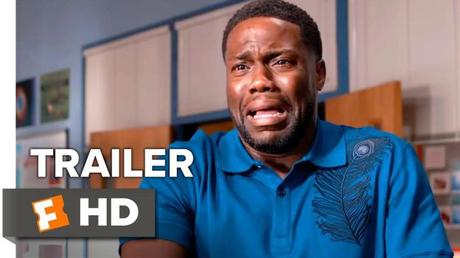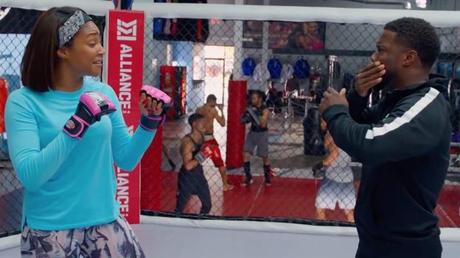Night School is about a high school dropout attempting to get his GED. Naturally, the film can end only one of two ways: either he gets the GED or he doesn't. It shouldn't register as too big of a surprise to learn that, yes, this rather lighthearted, very mainstream, very middle-of-the-road comedy ends with the nice guy main character (Kevin Hart) getting everything he wants after having gone on a journey of mild personal growth. He passes the titular night school and lives on to thank the Lord his best friend (Ben Schwartz) is willing to give him a job at a high finance firm without even an hour of college credit to his name, let alone a degree. His wildly successful, model-gorgeous girlfriend even takes him back despite having been lied to for months about what he was really up to with all of those late nights (he was too embarrassed to admit he was in night school).
All's well that ends well.
I guess.
But, Night School does something genuinely surprising before it gets to all of that. Hart, his tough-as-nails teacher (Tiffany Haddish, re-teamed here with her Girls Trip director Malcolm D. Lee), and the assorted comic relief classmates he's bonded with (led by Rob Riggle) gather in a parking lot to view their GED test results together just as soon as they're posted online. One after another, they all learn they passed, some by literally a single point, others with extreme ease.
They, of course, don't actually matter. This isn't their movie, and their personal triumphs are largely rushed past. What the movie really cares about is what happens to Hart, meaning he's naturally the last one to look at his results. He's too nervous to do it. So, he hands his phone to Haddish, and mistakes her instantly grim face for a gag. Surely she looks so sad because she's playing a prank, duping him into assuming the worst before revealing he passed.
She's not. She looks that way because he genuinely failed. In fact, it wasn't even close. On a test where 145 is a passing score, he got 117.

That's because Night School seems to suddenly realize it has devoted nearly 90 minutes to arguing an adult man who has lived his entire life with various undiagnosed learning disabilities, including dyslexia, can be cured through hijinks and bizarre MMA-style fights with Haddish. As seen in the trailers, she tries to use violence to teach him how to concentrate, and while it does eventually work to the point that he can at least recall the chemical formula for water it doesn't mean he has all the tools he needs to pass a standardized test. So, he fails.

Undeterred, he optimistically pledges to simply retake the test, and his friends all boast he'll pass the retake no problem.
Then he fails again.
In fact, through a montage we see him retake and fail the test again at least 5 different times. Hart greets each failure with a smile and determination to simply do better next time, even as his friends and family (led by a sorely underused Keith David as his disapproving dad) shake their heads in worry. We see him in various test-taking settings, Beautiful Mind-like visuals throwing the words and figures on the page up in the air at him as he attempts to sort them out. Such imagery is usually used in film to connote genius. It's now a staple of Sherlock Holmes adaptations, for example. Here, it's used to illustrate the challenge of simply being able to read and comprehend basic questions when you are someone with dyslexia and Dyscalculia, which is similar to dyslexia but specific to an inability to understand/comprehend numbers.
Eventually, Hart's character passes, his friends put him on their shoulders - which is not hard since he's so pint-sized, a joke the film itself makes repeatedly - to celebrate, and we close on a triumphant speech at a high school graduation ceremony. I'll soon forget the film's final moments and most of its jokes. However, I won't soon forget this particular montage because I've never seen anything quite like it before.
I appreciate there is now a movie my dyslexia-suffering brother can watch and feel acknowledged, particularly how much harder he always has to work to concentrate/read and how extra intimidating written tests seem to him. Kevin Hart portrayed that quite accurately, and it's a facet of learning which is rarely depicted on film.
For that, I thank you, Night School.
For everything else, meh. The best jokes are all in the trailer, and they were never that great to begin with. It's just another poorly made comedy - so many plot points are connected by obvious oh-shit-let's-fix-it-in-post ADR - which barely meets the bare minimum of making you laugh a couple of times. Tiffany Haddish and Kevin Hart paired together like this sounds so much better in concept than in execution. Since he's the bigger name and also a producer on the film, Hart understandably demands far more screen time. Most of the time he's around on his own, though, you simply wish you were watching Haddish. This isn't her finest performance - the script never can settle on a tone for her, veering broadly funny one scene, sympathetic and sincere the next - but she's the reason to see the movie, not Hart.
That is, until the ending. In that wonderful montage, Night School showed its heart truly is in the right place.

